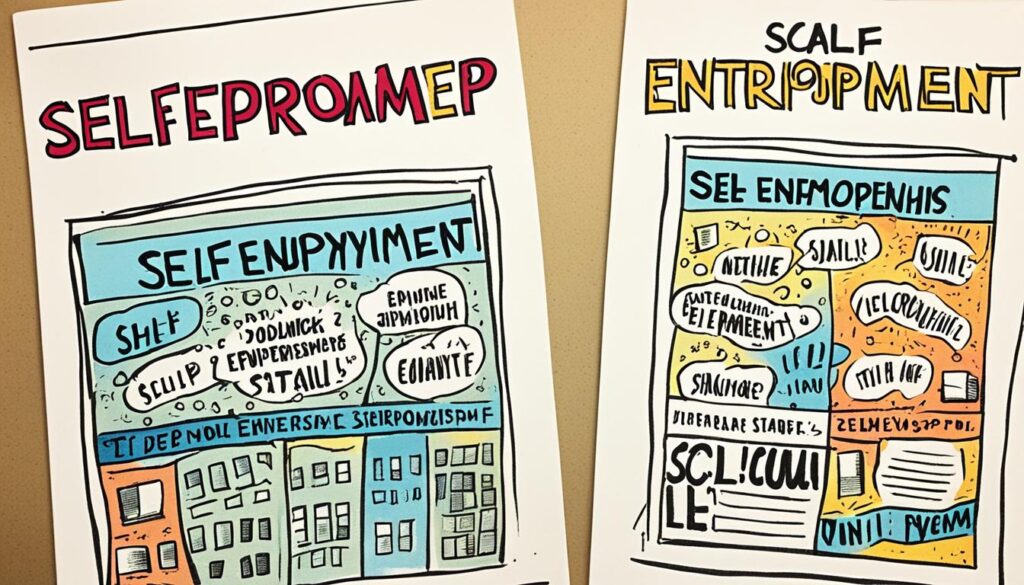In 2022, entrepreneurs in Shopify’s ecosystem created 5.2 million jobs worldwide. This shows the big impact entrepreneurs have. Yet, before jumping into entrepreneurship, it’s crucial to see if it’s the right fit for you.
Key Takeaways:
- Entrepreneurs can earn a lot and make decisions fast.
- Starting a business comes with financial risks and tough competition.
- Entrepreneurship lets you work how you want and follow your passion.
- Successful entrepreneurs plan their business and know their customers well.
- It’s vital to check if the entrepreneur life suits you and to understand its challenges.
Starting and growing a business is tough. Think about if entrepreneurship suits you before starting. Consider your interests, how well you solve problems, and if you’re driven to take charge of your life.
Aspiring entrepreneurs have many options. These include owning a small business, innovating, consulting, and creating content. Some start businesses as side projects while keeping their day jobs. They may also earn from sponsorships, selling products, and subscriptions. Aspiring entrepreneurs can also leverage the digital space by exploring opportunities such as freelance work, social media management, and online tutoring. Many of these roles, including some of the *best online jobs for teens*, provide flexible schedules and allow individuals to earn while building valuable skills. As they gain experience and credibility, these entrepreneurs can scale their ventures into more substantial endeavors. Additionally, aspiring entrepreneurs can earn money online for free by utilizing platforms that have no upfront costs, such as starting a blog, launching a YouTube channel, or promoting affiliate marketing products. By offering valuable content or services, they can build an audience and eventually monetize their efforts through ads, sponsored posts, or product sales. With persistence and strategic effort, these no-cost opportunities can lead to significant income streams over time.
Being successful requires a good idea, passion, and money to start. You need a business plan and to know who your customers are. Finding money, creating a brand, and marketing your business are key steps.
Entrepreneurship has its tough spots. You might face financial risk, work long hours, deal with stress, and face a lot of competition. But, the chance to earn a lot, work how you like, and make your own decisions can be worth it.
Thinking about entrepreneurship? Make sure this lifestyle fits you, know the challenges you might face, and get ready to make your business idea reality.
Understanding the Challenges of Entrepreneurship
Entrepreneurship is an exciting journey filled with chances and tough challenges. You will face many obstacles while trying to grow your business. Knowing these challenges helps you navigate and increase your chances of success.
The Challenge of Scaling a Business
Scaling a business is a big challenge for entrepreneurs. It’s an achievement to start a business, but growing it is another story. This growth involves finding more customers, making more money, and expanding operations.
To scale successfully, entrepreneurs need to plan how to grow and find their edge in the market. It’s important to keep innovating and improving what you offer to stay ahead.
Competitive Advantage and Consumer Value
Having a strong edge is crucial in a competitive entrepreneurial world. This edge makes your business stand out and attracts customers. It could be something special about your product, technology, or how you treat your customers.
By showing what makes you different, you can build loyal customers. Also, focusing on giving great value is key for success. Knowing what your customers want helps you create offers that they love.
Overcoming Challenges to Business Growth
Growing a business comes with its own challenges. Entrepreneurs often find it hard to manage everything, which can be overwhelming. Setting specific goals and creating good habits are essential to deal with these issues.
Goals should be clear and broken into smaller steps. This way, you can see your progress and stay motivated. Good habits, like managing your time well, help you keep moving forward.
Building strong connections is also important for entrepreneurs. Understanding what your customers and team need helps you serve them better. Good leadership and taking responsibility guide your business through challenges.
Learning from mistakes and building trust are crucial for success. To sum up, being an entrepreneur is hard but rewarding. By facing the challenges head-on, you can grow your business and make it thrive. It takes dedication and the will to keep learning and improving. With the right attitude, you can face any obstacle and succeed.
Assessing Your Lifestyle Compatibility
For military spouses or anyone seeking flexibility and work-life balance, entrepreneurship is a great choice. If you want a business that fits with your life, first see if lifestyle entrepreneurship matches you.
Lifestyle entrepreneurship is about forming a business that suits your life. It values happiness and life quality as much as, or more than, profits. Think of Richard Branson of Virgin Group. He focused more on enjoying life at first than on making profits.
Lifestyle entrepreneurs are known for being flexible, committed, independent, realistic, and resilient. These features help them tackle the special challenges of running a business while maintaining a balance between work and life.
Lifestyle entrepreneurship comes with the freedom to spend more time with family, set your schedule, and use your strengths. You can also earn unlimited income from different sources. Writers, for example, can keep earning from their books long after publishing them.
To make money, lifestyle entrepreneurs usually sell info, skills, or physical goods. These methods vary in flexibility and growth potential, depending on what you want and need.
Picking the right e-commerce platform is key to supporting your lifestyle business. Shopify and WooCommerce are popular choices. They give you the tools to build and manage an online store successfully, reaching more customers.

| Entrepreneur Type | Characteristics | Motivations | Strengths | Challenges |
|---|---|---|---|---|
| Growth-Minded Mountaineer | Seeking ambitious growth and expansion | Driven by competition and achievement | Visionary, strategic thinking | Risk of burnout, difficulty with delegation |
| Plucky Trailblazer | Thrives on innovation and novelty | Passionate about challenging the status quo | Creative problem-solving, adaptability | Risk of impulsivity, need for ongoing stimulation |
| Always-Be-Prepared Cartographer | Practical, cautious, and detail-oriented | Driven by stability and control | Thorough planning, risk mitigation | Tendency towards perfectionism, resistance to change |
| Risk-Taking Firestarter | Comfortable with calculated risks | Motivated by excitement and challenge | Ability to inspire and influence others | Impatience, tendency to overlook potential pitfalls |
| Steady Outsider | Value stability and predictability | Driven by security and work-life balance | Reliability, consistency | Limited risk appetite, potential resistance to change |
Understanding the types of entrepreneurs can help find your best path in lifestyle entrepreneurship. The Founder’s Zodiac series is a great tool for getting personalized advice. It helps you find business ideas and set objectives.
By checking how well lifestyle entrepreneurship suits you and knowing about different entrepreneur types, you can confidently start your journey. You can make your business dream work with your lifestyle.
Self-Employment versus Entrepreneurship
Thinking about your career future? It’s key to know the difference between self-employment and entrepreneurship. They offer unique opportunities but are different.
Self-employment means working for yourself. This could be as a freelancer or sole proprietor. You could be a freelancer, consultant, artist, or even a property manager. It gives you independence and lets you control your career path.
Entrepreneurship is about starting and growing a new business. It’s for those who love to innovate and take on challenges. Entrepreneurs take bigger risks but can gain more if their business grows.

Entrepreneurs need to be creative and solve problems. They work to create jobs and make a lasting mark on the market. They do this by developing business models, getting funding, and building teams.
Self-employment, however, focuses on what you already know how to do. It’s less risky and needs less money to start. It’s more about making a living, being independent, and working with fewer clients.
Some see self-employment as a first step to being an entrepreneur. Think about what you want for your future. If you like being independent and using your current skills, self-employment might be for you. But if you’re into creating new things and want growth, entrepreneurship could be your path.
| Self-Employment | Entrepreneurship | |
|---|---|---|
| Definition | Working independently as a freelancer or sole proprietor | Creating and managing a new business venture with a focus on innovation and growth |
| Risks | Lower business risks | Higher risks |
| Rewards | Potential for high earnings | Potential for higher rewards once the business scales |
| Skills | Rely on existing skills and services | Require creativity and problem-solving |
| Business Scope | Serve a small number of clients | Emphasis on scalability and growth potential |
Whether you choose self-employment or entrepreneurship, both can lead to success. Consider what you’re good at and where you see yourself in the future when choosing your path.
Resources for Potential Entrepreneurs
If you’re thinking of starting a business, plenty of resources are out there to help. They provide knowledge, aids, and connections for tackling entrepreneurship challenges. Notably, the Small Business Administration (SBA) and government programs can greatly aid new entrepreneurs.
Small Business Administration (SBA)
The SBA supports small businesses, crucial to US economy health. They offer distinct resources to help start and grow your business.
> “The SBA is key in promoting small businesses across the US. Their support includes access to capital, government contracting, counseling, and disaster help. With SBA resources, your business has a better chance to thrive.” – John Johnson, XYZ Enterprises founder.
At the SBA’s website, find articles, webinars, and business plan templates. It even has financial aid programs and networking chances. The site guides on law, intellectual property, and marketing too.
In every state, SBA offices provide tailored help through consultations and workshops. They also work with local partners, like SCORE and SBDCs, offering more aid and advice.
Government Programs for Business Development
Alongside the SBA, other government initiatives help entrepreneurs grow. These efforts aim to boost the economy, create jobs, and spur innovation.
The Global Entrepreneurship Congress (GEC) encourages worldwide cooperation among entrepreneurs. It’s a yearly summit where founders and investors share insights. Being part of it can widen your network and expose you internationally.
> “The GEC was transformative for me. It allowed me to meet others in my field and learn globally about entrepreneurship. The experience and connections from GEC have been vital for my business.” – Jane Smith, at ABC Tech Solutions.
There’s also a four-week online Entrepreneurial Mindset Facilitator Certification Training. It teaches how to foster entrepreneurial thinking in various settings, equipping attendees with needed tools.
Using the SBA and government programs’ resources can inform and support your venture. They offer educational content, mentorship, capital access, and networking. Embracing these resources can confidently guide you through entrepreneurship, boosting your chance for success.

| Resource | Description |
|---|---|
| Small Business Administration (SBA) | A government agency providing a rich array of resources for small businesses and entrepreneurs, from funding and advice to training and recovery assistance. |
| Global Entrepreneurship Congress (GEC) | An annual global event that gathers founders, investors, and stakeholders for collaboration, sharing insights, and networking. |
| Entrepreneurial Mindset Facilitator Certification Training | This four-week online class teaches how to encourage entrepreneurial thinking in classrooms, organizations, and communities, offering tools and knowledge to inspire. |
Seeking Small Business Assistance
You’ve taken a big step by deciding to become an entrepreneur. Now, it’s time to find help to make your business a success. Many resources are there for small businesses. You can look into military, government programs, or non-profit organizations for support.
Microenterprise Development Organizations (MDOs) are key to helping small businesses. They offer specialized help for very small companies, usually with 1 to 10 workers. They know the unique problems small businesses face and have programs to help entrepreneurs succeed.
Often, MDOs work with the Federal Small Business Administration (SBA). The SBA has many services from business planning to marketing and finance help. Their partnerships with MDOs provide a big support network for entrepreneurs.
Small Business Start-Ups are the focus of many programs. They help new businesses or franchises start strong. With mentorship, money, or technical support, they give new entrepreneurs a good base.
If you want to help your community, think about starting a social enterprise. These projects are started by community groups and aim to solve social or environmental issues. They combine business with a mission to do good and be sustainable.
Finding money is critical for small businesses. Programs offer advice on showing your financial success to attract investors or lenders. Community loan funds and CDFIs give important monetary support to help business visions come true.
Types of Assistance Provided by Small Business Stations
| Assistance Type | Description |
|---|---|
| Business Planning | Guidance and support in developing a comprehensive business plan. |
| Management | Training and resources to improve management skills and decision-making. |
| Marketing | Strategies and tools to effectively market products or services to target customers. |
| Licenses and Permits | Assistance in navigating the legal requirements for operating a business. |
| Financing | Information and access to funding options to support business growth and operations. |
Remember, success doesn’t happen overnight. Your business journey might take months or years. But, with determination and the right support, you can make your business dream a reality. So, look into these programs and use their help to your advantage.

Locating Mentors and Peer Support
It’s key for entrepreneurs to find mentors and build strong peer support. This helps you tackle the hurdles of starting and growing your business. By linking up with those who’ve been there and others in your boat, you can grab valuable tips, support, and chances to work together.
Seeking Mentors
Mentorship is a huge part of becoming successful for entrepreneurs. Mentors have been through it all and can share guidance, support, and wisdom. They’ll give you advice, insights into the industry, and help you dodge common mistakes.
“A mentor is someone who allows you to see the hope inside yourself.” – Oprah Winfrey
To find mentors, look into programs like SCORE, eMentor, and American Corporate Partners. They match entrepreneurs with pros who can offer specific guidance and support.
Building a Peer Support Network
Joining a peer support group links you with other entrepreneurs who face similar struggles. You’ll meet leaders and peers from various fields, bringing new viewpoints and insights.
It’s important to be active in these groups. Pay attention during meetings, bring your plan, and dive into deep talks with others. Keeping things confidential in the group helps everyone plan and discuss openly.
Sharing your strategic plans makes you accountable and helps with carrying them out. It also keeps your plans fresh and opens the door for helpful feedback and joint efforts.
Being an entrepreneur can feel lonely, especially without a strong network. Peer support lets you exchange ideas, strategies, and lessons learned. It encourages learning, boosts creativity, and drives you towards success.
Networking Opportunities
Networking is crucial for growing your contacts and finding new opportunities. Go to events, conferences, and meetups to meet like-minded peers.
Joining professional associations and online groups helps you connect with peers in your field. These spaces offer chances for online chats, sharing knowledge, and working together.
| Benefits of Mentors and Peer Support | Statistics |
|---|---|
| Learning from experienced entrepreneurs | 73% of mentored startups succeed |
| Enhancing accountability and goal setting | 85% of entrepreneurs with peer support meet their goals |
| Source of inspiration and motivation | 72% feel inspired by their network |
| Networking for partnerships and opportunities | More than 80% have found partnerships through networking |

By seeking mentors, creating a supportive network, and using networking chances, you can boost your entrepreneurial path. Remember to be clear on what you need and aim for. This helps you build a network that truly benefits you.
Entrepreneur Self-Assessments
Knowing your strengths, weaknesses, and what drives you is key on your business journey. Self-assessments for entrepreneurs offer insights to help you succeed. Let’s look at some popular tests to understand yourself and boost your business potential.
The Myers-Briggs Type Indicator (MBTI) is well-known for evaluating personality. It looks at aspects like whether you’re outgoing or reserved, and how you make decisions. Knowing your MBTI type helps you know yourself better. This makes it easier to decide things and work with others effectively.
The Prevue HR Systems assessment checks traits important for business success. Traits like competitiveness, how motivated you are by money, your work ethic, and your creativity are tested. You rate yourself from strongly disagree to strongly agree to see your strengths and what you can work on.
The StrengthsFinder 2.0 test shows your top five strengths from 34 options. Knowing and using your strengths well can help you excel in business.
Being honest when you take these tests is important. Truthful answers give you clearer insight into your business personality. These aren’t about passing or failing, but understanding and improving yourself.
Using self-assessments is a great first step in your business career. They help and encourage you by giving useful feedback and practical advice. By knowing your entrepreneurial skills, you make smarter choices, reach your full potential, and succeed in business.
| Assessment | Description |
|---|---|
| Myers-Briggs Type Indicator (MBTI) | Evaluates personality dimensions to understand natural inclinations and preferences. |
| Prevue HR Systems | Assesses entrepreneurial traits, including competitiveness, work ethic, and idea generation. |
| StrengthsFinder 2.0 | Identifies and leverages your unique strengths from a list of 34 possible themes. |

Remember, these tools are for getting to know yourself better. They’re a beginning point for thinking about yourself and growing personally. Knowing your strengths, weaknesses, and drivers helps you move forward confidently and purposefully in business.
Conclusion
Choosing to become an entrepreneur is a big deal. It needs a lot of thought. Yet, the rewards and chances it brings are worth looking into. Many experts point out the perks of being your own boss, like financial gains and personal freedom.
Being an entrepreneur isn’t easy. It comes with challenges and risks. You need to work hard, stay strong, and be good with people. But with the right help and guidance, your chances of success grow.
Entrepreneurship gives you control and lets you follow your heart. Whether you work from home or alongside well-known companies, it’s up to you. There’s a growing community of entrepreneurs ready to share their drive and support with you.
In the end, being an entrepreneur is about more than making money. It offers a chance for personal growth and to make a difference. With your skills and passion, you’re set for a journey that blends business achievement with self-improvement.









